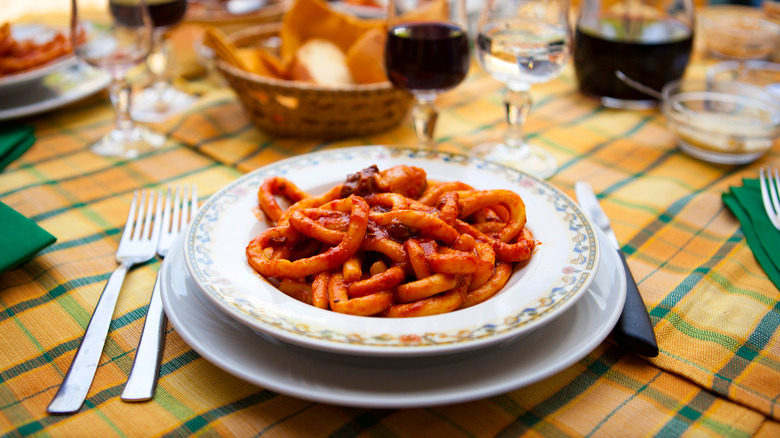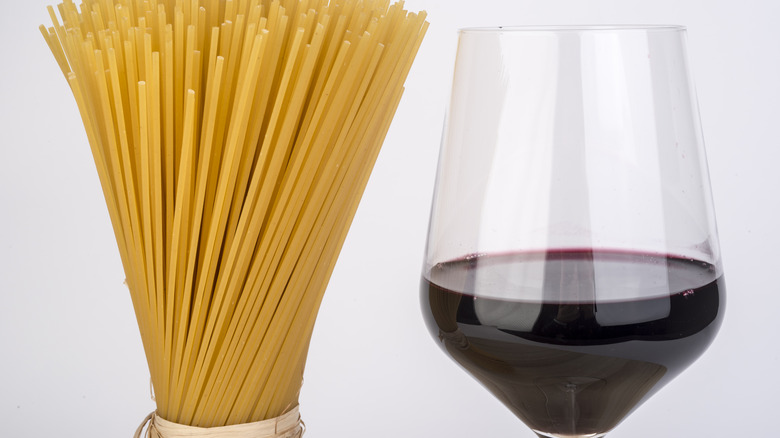Your Pasta Will Taste Effortlessly Rich With One Simple Swap
Pasta is always a good go-to dish, whether you need something to whip up quickly after a busy work day or even if you want to create a delicious high-scale meal for a date night at home. As a result, pasta is something you might see pretty often in the kitchen — and while that's not bad in and of itself, it means that your usual rotation of pasta dishes falls at risk of getting a bit humdrum. Luckily, there's something you can do to seamlessly remedy this issue.
Cooking your pasta in other liquids besides water is not only an interesting way to throw a curveball at your tried and true recipes, but it also helps to conserve water in the process. When it comes to which liquid substitute you should use, red wine ought to be at the top of your must-try list. Of course, red wine is quite accustomed to being used in recipes, but actually cooking your pasta in the wine (or making a wine-based pasta sauce) can truly level up your dinner routine with practically no extra effort.
What does wine do to pasta?
First of all, and probably most obviously, cooking pasta in/with red wine will color your noodles a deep, rich shade of red or even purple. From a cosmetic standpoint, this addition lends an aesthetic quality to your pasta that is frankly stunning, especially when topped with other interesting ingredients such as pistachios and burrata, pancetta and parmesan, or walnuts and parsley. Even if it's your first time experimenting with red wine pasta, you're sure to yield a dish that satisfies the eyes before even taking a bite.
Besides simple appearances, red wine also provides a huge flavor boost to whichever pasta dish you decide to make. The alcohol content present in red wine actually helps to break down any fats and oils present in your dish, which means that their flavors are accentuated by the mere presence of the wine. Even though the more subtle characteristics of a particular wine are likely to be lost during the cooking process, you're still going to get the boldness that red wine is known for, as well as the tannic elements that make the pasta dish more interesting as a whole.
Choosing the right wine for pasta
Adding wine in a pasta or pasta sauce is one of many tips you can try out, but is there a specific wine you should select for the job? From the get-go, you should definitely use one that you would have no trouble drinking and should forgo a cooking wine, which is salty by comparison. A good rule of thumb is if you know you like a specific wine on its own, then there's a good chance that you'll enjoy it in a dish, too.
As far as specifics go, most recommendations lean toward using a dry wine with some acidity, such as a Chianti or other sangiovese-based wine. This acidity also happens to balance itself out with the acid found in tomatoes, if you happen to be using tomato sauce. A nice syrah is also a good option to add some wonderful peppery notes to your dish. You could certainly opt for a wine with a fuller body or some more sweetness if that's your preference, but keep in mind that the extra sugar and other flavor components may conflict with your pasta dish, depending on what's in it. Ideally, you'll want to add something that tastes great on its own (someone has to finish off the bottle, right?) and contributes to the overall dish. So if you want to add some extra pizzazz to your pasta night, you need not look any further than your wine rack.


